The 1,4-Dicyclohexylbenzene Market is estimated to be valued at USD 141.2 million in 2025 and is projected to reach USD 203.1 million by 2035, registering a compound annual growth rate (CAGR) of 3.7% over the forecast period.
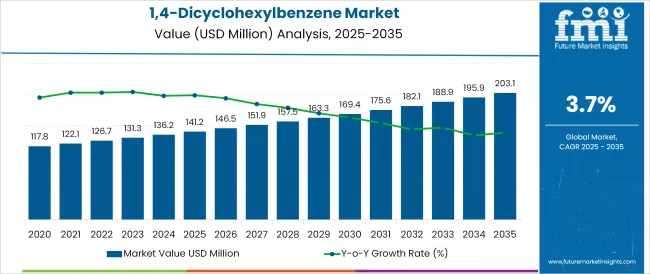
The 1,4-dicyclohexylbenzene market is undergoing steady expansion, driven by increasing usage in high-performance materials and specialty chemical formulations. This compound known for its thermal stability and dielectric properties, is gaining prominence in sectors such as electronics, adhesives, and high-temperature lubricants.
Growing demand for advanced composites and polymer additives especially in automotive, aerospace, and industrial manufacturing has elevated the importance of high-purity aromatic intermediates.
Chemical manufacturers are focusing on purity optimization and customized molecular profiles to meet specific processing and formulation needs. Additionally, advancements in chemical synthesis and purification technologies have enabled more efficient production of ultra-pure grades supporting stringent application requirements.
The shift toward performance-oriented chemical formulations, along with increased R&D investment in polymer chemistry and functional adhesives, is paving the path for future market growth.
Expansion in end-use sectors across Asia-Pacific and North America, particularly in adhesives and electronics, is expected to further strengthen the long-term outlook for 1,4-dicyclohexylbenzene.
The market is segmented by Product Type and Application and region. By Product Type, the market is divided into Above 99% and Below 99%. In terms of Application, the market is classified into Adhesives, Paints & Coatings, Electrical & Electronics, Chemical Intermediate, and Others.
Regionally, the market is classified into North America, Latin America, Western Europe, Eastern Europe, Balkan & Baltic Countries, Russia & Belarus, Central Asia, East Asia, South Asia & Pacific, and the Middle East & Africa.
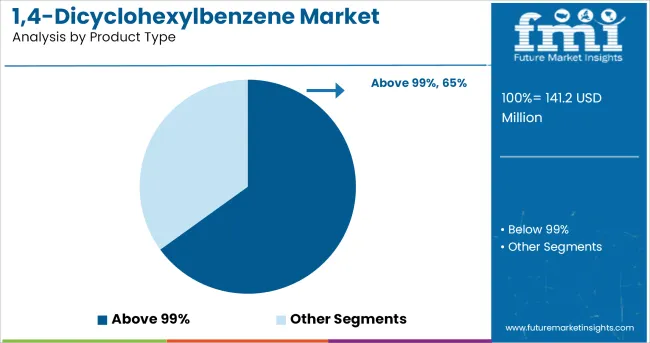
The above 99% purity segment is projected to command 65.0% of the total market revenue in 2025, making it the dominant product type. This strong position is driven by the growing need for ultra-pure aromatic intermediates in high-performance materials, where even trace impurities can compromise end-use effectiveness.
The above 99% grade is favored for its enhanced thermal stability, low volatility, and superior compatibility in chemical synthesis especially in demanding applications such as dielectric fluids, liquid crystals, and advanced adhesives. As regulatory and performance standards tighten across various industries, the demand for ultra-high-purity formulations has surged.
Moreover, advancements in catalytic hydrogenation and purification technologies have enabled scalable production of above 99% grades with consistent quality, supporting wider adoption. This segment's leadership reflects its critical role in ensuring consistency, safety, and functionality in complex formulations, particularly in electronics, automotive, and industrial manufacturing sectors.
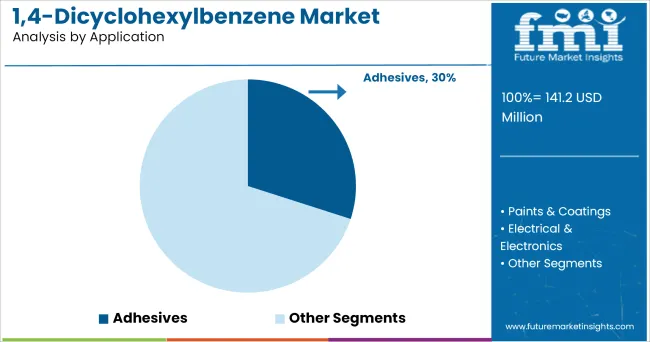
In the application segment, adhesives are expected to hold 30.0% of the total market revenue in 2025, making them the leading use case for 1,4-dicyclohexylbenzene. This is being driven by the compound’s ability to enhance bonding strength, thermal resistance, and viscosity control in specialty adhesive formulations.
Industrial and structural adhesives, especially those used in automotive and construction applications, increasingly rely on 1,4 dicyclohexylbenzene for improving performance in high-temperature or high-stress environments.
The compound’s chemical stability and compatibility with resins and polymers have enabled its integration into formulations requiring long-term durability and moisture resistance. Adhesive manufacturers are also adopting this compound for its role in enabling low-VOC and environmentally compliant solutions, aligning with global regulatory trends.
Continued growth in manufacturing, packaging, and assembly-line industries coupled with demand for tailored adhesive properties has reinforced the position of adhesives as a primary driver in the 1,4-dicyclohexylbenzene market.
Driven application across diverse industries, the 1,4-Dicyclohexylbenzene market experienced significant growth during 2020 to 2024. However, owing to nationwide lockdowns and its negative impact on economic activities across different sectors, the sales of 1,4-Dicyclohexylbenzene plummeted in 2024. Given this impact, the 1,4-Dicyclohexylbenzene market has recorded a CAGR of 0.82% for the period 2020 to 2024
Key factors driving the sales of 1,4-Dicyclohexylbenzene include growth in automobile sales. Sales in the automotive industry are increasing consistently and this growth trend is expected to continue through the report’s forecast period.
The usage of 1,4-Dicyclohexylbenzene as an additive and solvent used in paints and coatings and plastic components used in automobiles is expected to push market growth in response to the increasing automobile sales during the forecast period.
Moreover, significant growth potential exists in emerging economies such as those in Asia Pacific. There is a considerable demand for dicyclohexylbenzene-based products in India and other Southeast Asian countries.
Since the chemical industry is consolidated, investment in product development by key manufacturers is expected to create considerable opportunity across various end-use industries. As per the report, the demand in electronics, pharmaceuticals, cosmetics and other sectors will lead to an increase in the consumption of 1,4-Dicyclohexylbenzene.
Over the recent past, it has been observed that various end-use industries are focusing on the use of solvents that are relatively less toxic to ensure human and environmental safety. This trend is caused by the implementation of stringent regulations against the manufacturing and use of solvents.
Guidelines followed by the manufacturers to produce their product with minimum solvent content may affect the overall growth rate of the p-dicyclohexylbenzene market in the forecast period.
To overcome this challenge, manufacturers are investing in developing economies such as India and Southeast Asian Countries to offset any potential slowdown from the developed markets in view of tightening regulations.
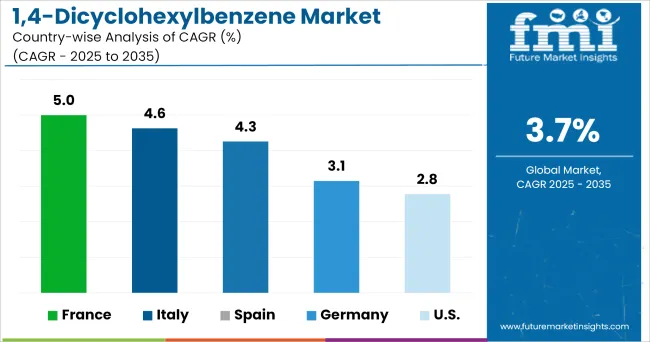
Germany is one of the key manufacturing hubs in the world for automobiles. The country is anticipated to hold almost 18% of the 1,4-Dicyclohexylbenzene market in Europe owing to its well-developed chemical and automotive sectors. Germany has substantial presence of paints and coating manufacturers which in turn elevates the demand for 1,4-Dicyclohexylbenzene in the country.
Moreover, some of the world’s largest chemical companies are based in the country with significant production infrastructure, thus creating significant opportunities for the market.
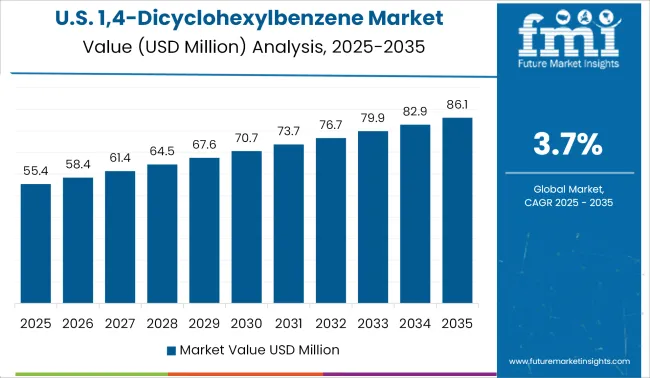
North America is predicted to remain one of the key markets during the forecast period, according to Future Market Insights. In 2024, the USA 1,4-Dicyclohexylbenzene market is expected to grow by 3.9% year on year after bucking initial skepticism caused due to the outbreak of global pandemic. Across the whole of North America, total sales of 1,4-Dicyclohexylbenzene is projected to reach 136.2 Million in 2024.
A reasonably high concentration of key industries in the USA is one of the main factors supporting the market growth. Moreover, Growing demand for paints and coatings in the country, from both decorative/architectural and industrial end users, in turn creates robust opportunities for 1,4-Dicyclohexylbenzene.
China is considered as manufacturing hub for the chemicals as well as automotive industries. The country is the largest market for automotive production and consumption in the world, thus exhibiting exponentially high demand for paints and coating products.
Accordingly China has emerged as a highly lucrative market for 1,4-Dicyclohexylbenzene volume, accounting for the consumption of around 46% of the global volume of 1,4-Dicyclohexylbenzene produced.
Given the business friendly governmental policies and presence of major industries in the country, China is also home to many key manufacturers of 1,4-Dicyclohexylbenzene, thus ensuring stable supply of the product in the domestic market.
Japan is one of key countries for Global 1,4- Dicyclohexylbenzene market. Demand in the country is anticipated to witness significant growth with a healthy CAGR of 3.2% to attain value of USD 203.1 Million by 2035 end. Demand is expected to rise in the country owing to strong presence of chemical industries. Chemical industries is key consumer of 1,4 – Dicyclohexylbenzene owing to its applications in synthesis of various vital chemicals.
Moreover, Japan is one of the leading countries in electronics manufacturing industry. Electrical and electronics industry exhibits increasing demand for 1,4 – Dicyclohexylbenzene. 1,4 – Dicyclohexylbenzene is used in manufacturing of liquid crystal displays of various electronic equipment such as watches, Phones, TVs and others.
Various research and development activities are underway to cater the rising demand for new and more specified electronic equipment. With the growing demand for high specification electronic equipment, the sales of 1,4 – Dicyclohexylbenzene are expected to rise substantially from electrical and electronics industry s in the country.
Revenue generated in the above 99% product segment of the 1,4-Dicyclohexylbenzene market is expected to grow at a robust 3.4% year over year in 2024. Demand for below 99% concentration segment is anticipated to increase by 4.1% between 2024 and 2024, giving the combined 1,4-Dicyclohexylbenzene market year-over-year growth of 3.9% in 2024, according to the FMI report.
Highly concentrated (above 99% purity) 1,4-Dicyclohexylbenzene is used in laboratory and research purposes and is experiencing a healthy growth owing to increasing focus on the sector, reinforced funding from respective governments and the realization of research supremacy as the path to economic growth.
1,4-Dicyclohexylbenzene is widely used as chemical intermediate in production of various chemicals. Approximately around 33% of 1,4-Dicyclohexylbenzene volume is used in chemical intermediate application, for the production of other key chemical products.
Chemical products such as phenol, which is further used in production of epoxy resins, Dicyclohexylbenzene hydrogen peroxide and isomers of Dicyclohexylbenzene are manufactured using 1,4-Dicyclohexylbenzene as an intermediate. These chemicals synthesized using 1,4-Dicyclohexylbenzene have variety of applications across industries and have significant demand in the market.
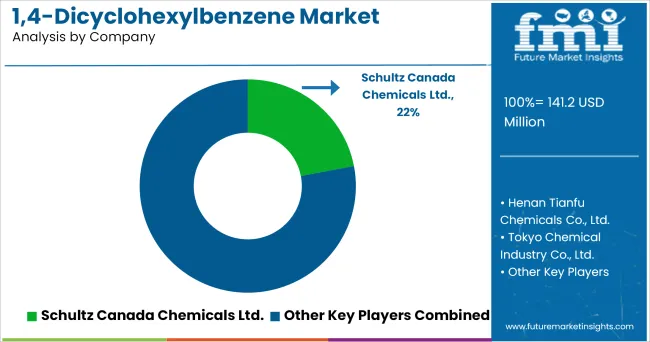
Manufacturers are adopting strategic mergers and acquisitions to expand their geographic footprint and revenue. They are indulging in research and development activities to improve the commercial potential of 1,4-Dicyclohexylbenzene through new product innovation to increase or commercialize new and high potential applications of the product.
Key manufacturers profiled in the report are
| Attribute | Details |
|---|---|
| Forecast Period | 2025 to 2035 |
| Historical Data Available for | 2020 to 2024 |
| Market Analysis | USD Million for Value and Tons for Volume |
| Key Regions Covered | North America; Latin America; Europe; East Asia; South Asia & Pacific; and the Middle East & Africa |
| Key Countries Covered | USA, Canada, Germany, UK, France, Italy, Spain, BENELUX, Russia, China, Japan, South Korea, India, ASEAN, Australia & New Zealand, GCC Countries, Turkey, Northern Africa, and South Africa |
| Key Segments Covered | Product type, Application, and Region |
| Key Companies Profiled | Schultz Canada Chemicals Ltd.; Biosynth Carbosynth; Henan Tianfu Chemicals Co. Ltd.; Changsha Easchem Co., Ltd.; Hefei TNJ Chemical Co. Ltd.; Jiangsu Zhongneng Chemical Technology Co., Ltd.; Tokyo Chemical Industry Ltd.; Syntechem Co. Ltd. |
| Report Coverage | Market Forecast, Company Share Analysis, Competition Intelligence, DROT Analysis, Market Dynamics and Challenges, and Strategic Growth Initiatives |
| Customization & Pricing | Available upon Request |
The global 1,4-dicyclohexylbenzene market is estimated to be valued at USD 141.2 million in 2025.
The market size for the 1,4-dicyclohexylbenzene market is projected to reach USD 203.1 million by 2035.
The 1,4-dicyclohexylbenzene market is expected to grow at a 3.7% CAGR between 2025 and 2035.
The key product types in 1,4-dicyclohexylbenzene market are above 99% and below 99%.
In terms of application, adhesives segment to command 30.0% share in the 1,4-dicyclohexylbenzene market in 2025.






Full Research Suite comprises of:
Market outlook & trends analysis
Interviews & case studies
Strategic recommendations
Vendor profiles & capabilities analysis
5-year forecasts
8 regions and 60+ country-level data splits
Market segment data splits
12 months of continuous data updates
DELIVERED AS:
PDF EXCEL ONLINE

Thank you!
You will receive an email from our Business Development Manager. Please be sure to check your SPAM/JUNK folder too.
Chat With
MaRIA